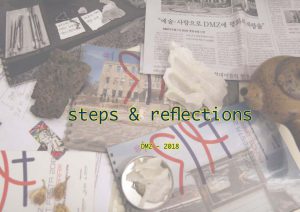Am / On: 02. März 2019, 19–22 Uhr / 7–10 p.m.

Am 2. März 2019 wird Frédéric Krauke eine Dokumentation in Form
von Fotografie, Video und Installation zu seinen Performances und Erfahrungen zeigen, die er 2018 entlang der DMZ, der entmilitarisierte Zone Südkoreas gemacht hat.
Als bildender- und performance Künstler aus Berlin stammend wurde er von dem koreanischen Organisator und Performance Künstler Kim Baekki dazu eingeladen, seine Performance-Serie steps & reflections in der DMZ zu realisieren. Über den Zeitraum von einer Woche suchte er den Kontakt und die Kommunikation im Austausch mit dem koreanischen Publikum und KünstlerInnen in Seogwipo, Paju, Imjingak, Gangwon-do, Cherwon und Goseong. Erstmals performte er in Südkorea 2013, anlässlich des KEAF Performance Festival.
„Die vielfältige Sprache traditioneller, idealistischer, abstrakter, künstlerischer und symbolischer Handlungen der Performance Kunst kann als eine Aufforderung zur Achtung der Menschlichkeit, der Freiheit des Ausdruckes und der Existenz, sowie dem Wunsch und die Hoffnung auf Frieden verstanden werden – trotz kultureller, historischer, politischer und zeitgenössische Unterschiede.“ F. Krauke
**** ****
On March 2, 2019, Frédéric Krauke will show documentary photographs and video and installations related to the performances and experiences he had along the DMZ, the De-Militarized Zone of South Korea, in 2018.
As visual and performing artist from Berlin, he was invited by the Korean performance artist and organizer Kim Baekki to do his performance series steps & reflections along the DMZ. Over a period of one week, he sought to make contact and enter into communication and exchange with the Korean audience, artists, and other individuals during performances in Seogwipo, Paju, Imjingak, Gangwon-do, Cherwon, and Goseong. He performed in
South Korea for the first time in 2013 on the occasion of the KEAF performance festival.
„The diverse language of traditional, idealistic, abstract, artistic, and symbolic actions involved performance art might be understood as a request for respect for humanity, for freedom ofexpression and existence, for the desire and hope for peace — despite cultural, historical, political, and contemporary differences.“ F.Krauke